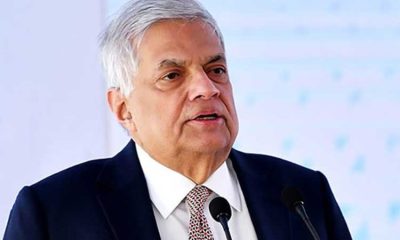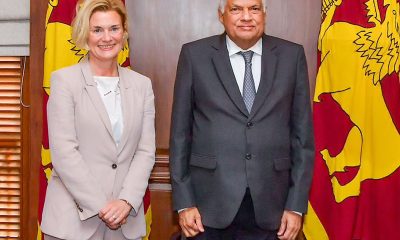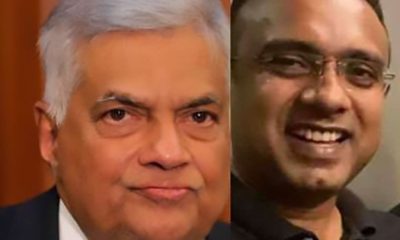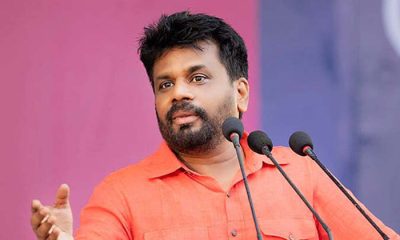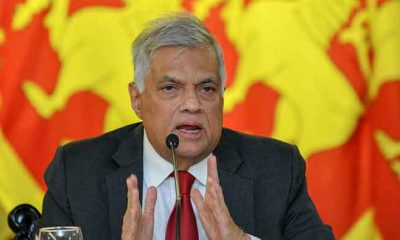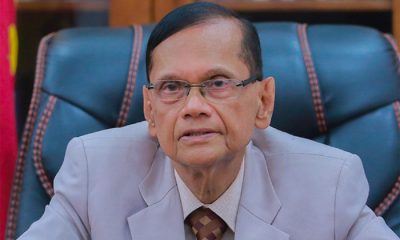Editorial
Readying for the big fight

The week that passed saw considerable political activity related to the forthcoming presidential election that must be held late next year in accordance with the constitution. Connected events included business magnate Dhammika Perera’s declaration that he is willing to run for president provided the political parties – he did not identify which parties though he said they included the SLPP – guarantee him 51 percent of the vote. Perera is no spring chicken not to know that no party nor anybody else can “guarantee” anybody a proportion of the vote. That must await the polling and the counting of the votes. The second event was the launching of Dilith Jayaweera’s new Mawbima Janatha Pakshaya (MJP) which opened its new party office in Colombo.
Neither Jayaweera nor Perera have declared themselves as candidates for the forthcoming presidential election. The only declared candidates up to now are Opposition and Samagi Jana Balawegaya (SJB) leader Sajith Premadasa and Anura Kumara Dissanayake of the JVP/NPP. Both Jayaweera and Perera have been staunch supporters of disgraced former President Gotabaya Rajapaksa. The Aragalaya-fuelled ejection of GR from the presidency he won comfortably in November 2019 propelled incumbent President Ranil Wickremesinghe into the hot seat. As is very well know, Wickremesinghe lost his own parliamentary seat in the parliamentary election that followed next August and led the UNP to stunning zero elected seats at that contest. Yet he entered the legislature through the UNP’s single National List seat and was anointed by Gotabaya first to succeed brother, Mahinda as premier and then GR himself as president.
All that, of course, is so much water that has passed under the bridges. Asked if he was a potential presidential candidate in November 2024, Jayaweera said at his party office opening: “First, we will give enough time of the MJP to succeed as a political movement across the country and then decide when to run for political office.” Perera, at a posh Nelumpokuna show in Colombo last week, declared that he does not invest in unwinnable projects. “I’m trying to unite a country divided by politics through education,” he said at this event celebrating the fourth anniversary of DP Education. Incidentally, DP stands not for Dhammika Perera but for Dhammika and Priscilla (Perera) Foundation which has already reached out to a claimed 1.5 million students enrolled in its programme which imposes no cost on the beneficiaries.
While Ranil Wickremesinghe has not declared himself as a candidate at the next presidential election, it is very clear that he is aspiring to an elected presidency. Much of what he says and does reflects that ambition. The SLPP which elected RW to office, and is keeping him there, is on record saying that it will field a candidate but it is very coy about who that will be. Pressed at news briefings it says that it will reveal the name “at the right time.
” Some SLPP parliamentarians have already expressed their support for RW. SLPP General Secretary Sagara Kariyawasam, widely considered to be the voice of Basil Rajapaksa, asked last week about the kite that Dhammika Perera has flown, responded that Dhammika is a valued member of their party. Several potential candidates are ambitious about running for president, and Dhammika being one of them is not a breach of party discipline. However, the SLPP has not decided on a candidate.
Political observers and commentators are of the view that more important than who the candidates will be next year is whether the election will be held on schedule in less than a year from now. According to Prof. GL Peiris, polling must be by September though GR’s term, which RW is serving out, would end only in November, But recent reports and statements that the government is looking at changes in the electoral system giving direct election (160 seats) a greater weight than the number elected by proportional representation (65 seat).
Justice Minister Wijeyadasa Rajapakshe has already presented a cabinet paper to this effect and a cabinet sub-committee going into it. This has triggered fears in political circles about an attempt to postpone elections. Such fears are legitimate in the context of the postponement sine die of the local election after nominations were accepted as well as elections to Provincial Councils.
A senior political analyst commented that in any society undergoing economic shock therapy that Sri Lanka is, it is vital that the safety valves be opened on schedule and that the public’s hope of a chance for change will not be frustrated. If next year’s presidential election is the earliest scheduled chance for a change, any experiment with the election laws should not be of a sort that defers the holding of that election. Our political history clearly proves that any blocking, retarding or distortion of the electoral calendar and/or process leads to violent upheavals.
Whether the SLPP will throw its weight behind Dhammika Perera, will remain with Ranil Wickremesinghe who arrested last year’s anarchy and restored a sense of normalcy – though at the cost of not repaying the country’s debt – or play a wild card will remain an open question certainly in the short term. The JVP/NPP has been demonstrating tight organization and growing support.
But it must be remembered that at the 2019 presidential election, Anura Kumara Dissanayake polled only 3.16% of the vote against Sajith Premadasa’s 41.99%. Undoubtedly both these candidates will pick-up SLPP votes next time round after GR destroyed his party’s rural agricultural base. Extensive Rupavahini publicity Dhammika Perera’s DP Education anniversary received last week demonstrates he’s not without government backers.
Editorial
Ensure safety of COPF Chairman

Saturday 8th June, 2024
It was with shock and dismay that we received the news about death threats to COPF (Committee on Public Finance) Chairman Dr. Harsha de Silva over the ongoing parliamentary probe into the on-arrival visa scam. Dr. de Silva yesterday told Speaker Mahinda Yapa Abeywardena, in Parliament, that he was facing death threats and intimidation, and it was incumbent upon Parliament to ensure his safety. He stopped short of naming names, but revealed that some ruling party MPs were among those who had ganged up against him. The Speaker only said there had been no complaint, and he would look into the matter.
The SLPP-UNP government has been doing everything in its power to have all parliamentary committees under its thumb. The COPE (Committee on Public Enterprises), which once helped restore public faith in the legislature by exposing state sector corruption, has now become a mere appendage of the incumbent regime, thanks to the appointment of SLPP MP Rohitha Abeygunawardena as its Chairman. The SLPP-UNP combine also tried to oust COPF Chairman Dr. de Silva, but in vain. However, it knows more than one way to shoe a horse.
The COPF, under Dr. de Silva’s chairmanship, has been a thorn in the side of the government, which is struggling to cover up numerous corrupt deals. Dr. de Silva yesterday told Parliament that he found it extremely difficult to function as the COPF head due to severe resource constraints his committee was facing; he himself had to pay the salaries of some of his staff members besides burning the midnight oil.
The sheer workload he had to cope with as the COPF chief had taken its toll on his health, he said, informing the Speaker that he was at the end of his tether, and at times thought of resigning from the COPF. This is exactly what the government wants him to do; resource squeezes and threats are aimed at making him quit.
On 26 May, Dr. de Silva revealed, in an ‘X’ post, that the COPF had uncovered some vital information about the visa scam and it would reveal everything after its final meeting on the issue; the COPF was committed to exposing the truth behind the controversial tender, he added. In an editorial comment on 27 May, we warned him.
While thanking him for his bold stand, we pointed out that by making such a statement, he had thrown caution to the wind, and become a marked target, with the government making an all-out effort to delay the COPF investigation lest the truth should come out much to the detriment of its interests in this election year. Unfortunately, what was feared has come about; Dr. de Silva is complaining of death threats and government moves to strangulate the COPF financially to derail its investigations.
Dr. de Silva’s predicament exemplifies the fate that befalls the few good men and women in Parliament. It is hoped that all those who seek an end to the state sector corruption will rally behind Dr. de Silva, and bring pressure to bear on the government to ensure his safety. Let Dr. de Silva be urged to reveal the names of those who have issued threats, veiled or otherwise, to him and are trying to scuttle the COPF probes.
Editorial
Dead man walking!

Friday 7th June, 2024
The SLPP-UNP government is going hell for leather to make bad laws as if there were no tomorrow. It is abusing its parliamentary majority, which has been retained with the help of some crossovers, for that purpose. The Opposition, the media and trade unions are up in arms, and understandably so. The incumbent regime is a dead man walking; it is so desperate that it is capable of anything. Hence the need for it to be restrained.
The Electricity (Amendment) Bill (EAB) plunged Parliament into turmoil yesterday, but the government secured its passage. The Supreme Court (SC) determined the entire EAB inconsistent with the Constitution and recommended changes thereto. After unveiling the Bill, sometime ago, Minister of Power and Energy Kanchana Wijesekera hailed it as an excellent piece of legislation aimed at straightening up the power sector to serve the public interest better.
The SC determination left him with egg on his face. He reminded us of the proverbial curate who, while eating a stale egg, assured his host, a Bishop, that parts of it were excellent. Wijesekera’s egg, as it were, made Parliament stink yesterday, but he sought to please his masters by praising it as a silver bullet.
EAB should have been discarded and a new one drafted in consultation with all stakeholders. But the government is apparently driven by an ulterior motive; its aim is not to serve Sri Lanka’s interests but to look after those of some moneybags.
It is not uncommon for Bills to contain some flaws, which are rectified either before or during the committee stage. But there is something terribly wrong with draft Bills that are full of sections inconsistent with the Constitution. The drafters of EAB have demonstrated their sheer ignorance of the supreme law, and that they are not equal to the task of drafting Bills. If they had read the Constitution at least perfunctorily, they would not have drafted such a bad law.
Ignorant and incompetent, they do not deserve to be paid with public funds and must be sent back to law school. They must be summoned before Parliament and questioned on their serious lapses, which have caused public faith in the national legislature to diminish.
Curiously, the MPs who demand that judges, doctors, Central Bankers, and other public officials be summoned before Parliament have taken badly drafted Bills for granted. The power sector trade unions yesterday alleged that EAB was of Indian origin and geared towards furthering the interests of Adani Group at the expense of Sri Lanka.
Most critics of EAB are agreeable in principle to the need for power sector reforms; the Ceylon Electricity Board should be given a radical shake-up, and transformed into a modern organisation capable of providing a better service at a lower cost. They only asked the government to tread cautiously, consulting all stakeholders and taking action to ensure that the country’s interests prevailed over everything else. But the government was in a mighty hurry to steamroller the Bill through Parliament, making the Opposition ask whether it was doing so at the behest of some external forces involved in controversial power generation deals here.
What is passed by the current Parliament can be either amended or abolished by a future parliament in a constitutionally prescribed manner. But that does not mean that a government is free to pass bad laws, making the country enter into long-term agreements with powerful nations and their investors. It looks as if the SLPP-UNP regime did not care two hoots about the consequences of its actions.
Editorial
Modi Magic on the wane

Thursday 6th June, 2024
The outcome of India’s parliamentary election (2024) has led to a ‘perspective ambiguity’. Prime Minister Narendra Modi lost no time in declaring victory for the BJP-led NDA alliance, which secured 293 seats in the 543-member Parliament, but he must be a worried man. The BJP is short of 32 seats to form a government under its own steam; it has lost 63 seats or about 20% of its parliamentary strength. It had 303 seats in the previous Parliament, and that number has dropped to 240.
Modi has become the second Indian Prime Minister to win a third term. The first PM to do so was Jawaharlal Nehru. But Nehru won an outright majority in Parliament in 1962; Modi has had to depend on smaller parties in his alliance to retain his hold on power. Modi must be reeling from a sharp drop in his victory margin in his own constituency, Varanasi; it has decreased to 152,000 from 480,000 in 2019 whereas Modi’s bete noire, Rahul Gandhi, won Raebareli by a staggering 390,000 votes.
Modi, who reigned supreme with 303 seats in the previous Parliament, is now dependent on parties such as Nitish Kumar’s JD-U and Chandrababu Naidu’s TDP to form a government. He has had to lead an alliance of strange bedfellows. Both Kumar and Naidu were bitter critics of Modi. Kumar helped form the oppositional alliance, the INDIA bloc, before switching his allegiance to PM Modi. Naidu also closed ranks with the BJP in the run-up to the election. These politicians have been described as extremely ambitious and highly unpredictable, and whether Modi will be able to manage them and consolidate his grip on the NDA alliance remains to be seen. They will demand plum ministerial posts in return for their support. The TDP is said to be eyeing Transport and Health portfolios! That is the name of the game in coalition politics, where it is not uncommon for the tail to wag the dog, so to speak. These two political leaders are however not the only problem Modi will have to contend with. The next five years will feel like an eternity for PM Modi.
Nothing would have been more shocking for the BJP than its defeat in Uttar Pradesh’s Faizabad constituency, where the Ram Mandir has been built. Modi may have thought he would be able to win the Lok Sabha election hands down after the consecration of that temple, which became a centrepiece of the BJP’s election campaign. The BJP lost that seat to the Samajwadi Party! Modi must be disappointed that the Ram Mandir hype failed to trigger a massive wave of support for his party. This particular defeat signifies a massive setback for the BJP’s ethno-religious agenda.
Modi’s divisive election campaign failed to yield the desired result. The BJP’s failure to secure an outright majority could be attributed to a host of factors, some of them being the suppression of the Opposition, the arrogance of power, chronic unemployment, and the rising cost of living. The BJP also did not care to reimage itself in a positive light to attract the youth.
Modi will hereafter see the Congress-led INDIA bloc with 223 seats, in his rearview mirror. The Congress (99 seats) and its allies have eaten into the BJP support base considerably, but they have a long way to go before being able to capture power.
The bumpy ride ahead for the BJP-led coalition government to be formed may improve the INDIA bloc’s chances of bettering their electoral performance and turning the tables on the BJP and its allies in time to come. Modi will have a lot to worry about in his third term.


